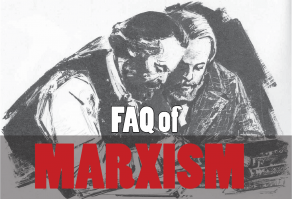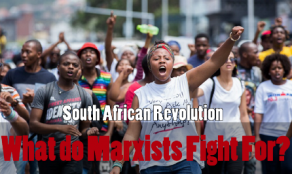Ever since the fall of the apartheid regime slightly more than two decades ago, there has been an ongoing attempt by the ruling class to construct a Chinese Wall between that monstrous dictatorship and the current regime of capitalist democracy. On the one hand, the method by which old guard of the ruling class aims to do this takes the form of a deception: that apartheid is "over"; that state power is supposedly in the hands of the "majority", that we live in a "democracy" in which the people decide, etc. All of this is a ruse which disguises the fact that because it owns and controls the means of production, the big bourgeois decides the fate of society much more surely than the government alone could ever do.

On the other hand, the other section of the ruling class, the black bourgeoisie, must seek to justify its own rule or be compelled to give it up. Therefore it must constantly differentiate between itself with the regime which preceded it.
Of course there is no doubt that for the working class the political freedom and democratic rights obtained is a major achievement. The real significance here as far as the working class is concerned, is that all of this has been achieved through its own struggle and not, as has been alleged, through the magnanimity of the dictatorship's last leaders nor through the visionary leadership of the liberation movement.
But Capitalism knows many forms of rule: fascism, military dictatorship, constitutional monarchy, bourgeois democracy, etc. One thing remain common among all these different regimes - the undiluted rule of Capital. The same is true of Apartheid. What distinguishes Apartheid from today's democratic regime is not different class relations, but a different method in which the same class relations are being exercised. In other words, the very same ruling class now uses different methods of rule to get the same results.
Has the overthrow of the dictatorship lessened the overall efficacy of the capitalists? Not in the least. Engels wrote that in a democratic republic "wealth exercises its power indirectly, but all the more surely first by means of the direct corruption of officials secondly, by means of an alliance of the government and the Stock Exchange." This has been the situation in South Africa since 1994.
Lenin emphasises this point in his celebrated book, The State and Revolution: "Another reason why the omnipotence of "wealth" is more certain in a democratic republic is that it does not depend on defects in the political machinery or on the faulty political shell of capitalism. A democratic republic is the best possible political shell for capitalism, and, therefore, once capital has gained possession of this very best shell (through the Palchinskys, Chernovs, Tseretelis and Co.), it establishes its power so securely, so firmly, that no change of persons, institutions or parties in the bourgeois-democratic republic can shake it."
This can clearly be seen in South Africa today. For the biggest part of the last two decades the ruling class has never had it so good. Between 1994 and 2013, the South African economy experienced positive growth in every quarter except for two of the 78 quarters. For the working class and the poor this does not mean much. Poverty, unemployment, and wealth inequality has all increased in the same period. In this context the demon of racism has also now reared its head lately. All of this has confirms that the fundamental problems of the working class and poor have not been solved. The black bourgeoisie calls this "a legacy of Apartheid." A much more scientific description of this is that all of this is a consequence of capitalism.
But today Capitalism is in deep crisis. Karl Marx explained long ago that in a society where want is general all the old crap revives. That is a very appropriate description of society today. Together with all the crisis of unemployment and inequality we have also seen the persistence of the demon of racism.
Now the three major political parties, have all expressed support for legislation which purports to criminalise racism. This comes after a week where racism has exploded onto social media and into the public domain. This question raises the question of what attitude we must take to this proposal. Will such a measure assist in the combating of racism?
The government said it was already working to add hate speech and racist behaviour to the current bill on hate crimes‚ which will now be redrafted and released for public for comment. This is the first point. In order to criminalise something, it is necessary to quantify it. In other words, what we are talking about here is not the criminalisation of racism per se, but of racist acts. But this is actually the lesser form in which racism manifests itself. The bigger part of racism is actually practiced much more subtly. It takes the form of a much more subtle racist "attitude" which is much more difficult to quantify into criminal law. This is the form it takes in the southern parts of the country like Cape Town. The aim here not to insult but to exclude and alienate. This is almost impossible to legislate against. Yet it is actually a much bigger form than the more overt types.
Then there is the issue of how acts of racism, once they have occurred, should be handled. The double exploitation of the black working class which historically took the form of both racial and class oppression has furnished the working class with very militant traditions. This is a precious legacy which must not be deluded. It is precisely this militancy which is needed to overthrow capitalism. And it is precisely this militancy which the working class has always used to fight back against all the ills of class society, including racism.
But the criminalisation of racism will undoubtedly be used by the enemy of the working class precisely to delude its militant struggle first by using the law against the necessary militancy of the working class and secondly to dissuade the workers to enter the field of struggle, not to "take matters in its own hands", to "let the law takes its course", etc. In other words it will be used with the aim of demobilising the working class.
Does this mean we should not support the criminalisation of racism. Not at all. But we have to point out its shortcomings under bourgeois law. Ultimately, racism cannot be defeated within the the very same system which spawns it.
The capitalist class will use every means necessary to hold the workers in chains and prevent them from overthrowing their system. In this, racism is an integral part. It serves a dual purpose: to divide the working class and to take the focus of the workers off the real source of their misery which is Capitalism. Therefore, any measure to combat racism, legal or otherwise, must be linked to the overthrow of capitalism itself. Only by removing its material premise will the demon of racism be defeated.


